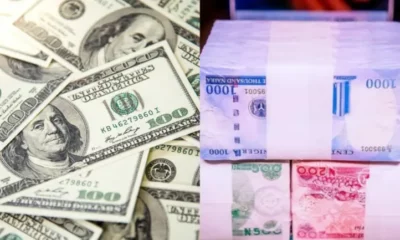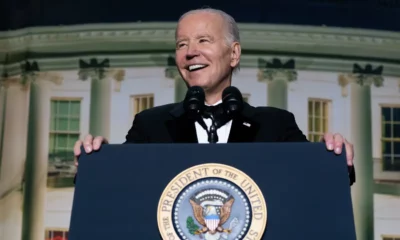News
FOREX: Why Prices Of Goods Will Remain High, Despite Naira Appreciation

There are indications that prices of goods and services may not come down soon despite the speedy appreciation of Naira against major foreign currencies in recent weeks.
On Thursday, US Dollars traded for N1,060, about N840 gain against N1,900 to US Dollar peak in February this year. But Vanguard findings show that prices of goods in the market are still on the rise contrary to the general expectations that with the continued positive trend in the exchange rate which started in late February, the market prices and general cost of living should be going down.
Most dealers and producers of goods and services blamed the high exchange rate for the spiral price increases in the market.
However, against the backdrop of the positive stability in the foreign exchange market, the National Bureau of Statistics, NBS, reported a further rise in inflation with a headline rate of 33.2 per cent in March as against 31.7 per cent in the previous month while food inflation rose to 40.02 per cent from 37 per cent.
Meanwhile, financial analysts and economists who spoke to Vanguard have indicated further rises in prices of goods and services in the months ahead before marginal stability can take place.
They also hinted that the current positive development in the foreign exchange market would have to be sustained over a longer period while other elements of the cost of doing business would have to come down before the impact of the lower exchange rate can positively affect the prices of goods and services.
Moreover, they explained that while price increases respond faster to upward increases in key factors of production, the reverse is the case when the factors are going down.
The analysts noted that positive exchange rate changes take time to trickle down to the prices of consumer goods. Explaining the discrepancy between the exchange rate stability against consumer price volatility, Victor Chiazor, Head, Research, FSL Securities, a Lagos-based investment house, said, ‘‘Apart from the time lag for the stability in the exchange rate to begin to reflect in the prices of goods and services, Nigerian price history shows that prices are sticky downwards but reflect immediately upwards.”
However, he gave further insight: “The rise in consumer goods prices was initially triggered by the currency devaluation along with high energy and transportation costs. But despite the recent appreciation of the Naira against the dollar, energy and transportation costs have remained high.
“Also, the appreciation in Naira will take some time to kick in before it begins to reflect in the price of goods and services.
“This price distortion shows how much dependence the economy has on foreign currency and shows that government policies towards locally manufactured goods in terms of infrastructure deficiency and incentives remain low.
“Just as we have seen inflation continue to rise despite consecutive increases in the monetary policy rate to curb it, the reality remains that the policy will require some time to kick in and take effect.
“A similar scenario is expected to play out around goods and services which are highly dependent on the exchange rate. It will take some time for the appreciation of the Naira to be transferred and trigger a drop in the cost of goods and services.”
Going forward, he said that the current policy decisions by the CBN Monetary Policy Committee, MPC, team will yield the desired result.
He, however, said that a prolonged duration of monetary tightening would become a headwind negative to economic growth.
“Hence, there is the need to effectively monitor the economy and know when to slow down on its tightening stance so as not to throw the economy into a session of negative growth.”
In his views, Ayorinde Akinloye, an Economic and Investment Strategist, said: “When economic policies are implemented, there is typically a time lag needed to see the impact of the policies on macroeconomic outcomes.
“Specific to the issue of appreciating Naira and still elevated prices of goods and services, the majority of consumer goods in circulation were produced or imported when the dollar was about N1,500 or more. As a result, we are yet to see the impact of the appreciation of the past month.
“Typically, a time lag of 60 – 90 days will be required to clear out the expensive goods before the ones imported at cheaper exchange rates begin to flow into the market.”
He, therefore, noted that the impact of the appreciation of the Naira will be felt from the end of May to June.
Speaking in the same vein, Gafar Bashiru, Senior Associate, Parthian Partners, another Lagos-based investment house, said though a stronger Naira is supposed to result in lower import costs and, eventually, a decrease in consumer goods prices, however, other factors, including structural issues, time tag, and speculative pricing, among others, have continued to fuel the current disparity.
He stated: “Exchange rate changes often take time to trickle down to consumer prices. Businesses may wait to adjust prices until they’re confident the currency appreciation is sustained. Inventory purchased at higher exchange rates may also need to be sold before price reductions occur.
“Also, factors like high transportation costs, insecurity, or inefficiencies in distribution networks can keep prices high despite a stronger currency and businesses might be hesitant to lower prices immediately, fearing future devaluation, leading to “sticky prices.”
“While prices are yet to drop, we are beginning to see a slower rate of increase. The month-on-month inflation figure for March reveals that the rate of increase in the average price level is less than the rate of increase in February 2024. This is a trend that is expected to be maintained in the coming months.
“It is also important to consider the base effect in the year-on-year figures. Considering that consumer prices were already high before the Naira appreciation occurred in the last two months (headline and food inflation stood respectively at 29.90% and 35.41% in January vs 33.20% and 40.00% in March), the decrease in prices might seem less significant.”
He further noted that in addition to the recent improvement in the strength of the Naira, policies that can help achieve sustainable price stability lie largely with the fiscal authority.
He cited structural reforms and focus on domestic production of competitive advantageous products as part of the fiscal solutions needed.
According to him, “Addressing structural bottlenecks in the economy, like improving transportation infrastructure and reducing bureaucratic hurdles, can make businesses more efficient and potentially lower production costs. This will translate to lower consumer prices.
“Implementing policies that incentivize local production of essential goods will lessen reliance on imports and make prices less vulnerable to fluctuations.”
Inflation bottleneck
Expressing similar views, David Adonri, Vice Chairman, Highcap Securities, argued that the main factor fueling Nigeria’s galloping inflation is insecurity, adding that import dependence on manufactured items is another cause. “When supply-side measures are taken, inflation will start declining. Inflation can start declining from the fourth quarter,” he stated.
Chinazom Izuora, Senior Associate, Parthian Securities, said: “It’s important to note that inflation is a lagging indicator.
Therefore, the effect of policy pronouncements in a given month will not be evident until subsequent months. However, it is noteworthy that headline inflation on a month-on-month basis moderated to 3.02% in March, which was 0.10% lower than the rate recorded in February 2024 (3.12%).
“This indicates a slowdown in the rate of inflation, though a marginal decline. We might not see a significant decline in the rate of inflation until Q3/Q4 but we expect to see gradual moderation month on month.”
-Vanguard.


 Business and Brands22 hours ago
Business and Brands22 hours agoTranscorp Group delivers impressive Q1 2024 performance; sustains revenue growth of 173% and PBT of N45 billion

 Entertainment24 hours ago
Entertainment24 hours agoDino Melaye declares Davido, leader of Nigerian music industry

 Top Stories23 hours ago
Top Stories23 hours agoNigerian Banks close 2million accounts over linkage of BVN, NIN

 News22 hours ago
News22 hours agoBlack Market Dollar (USD) To Naira (NGN) Exchange Rate Today 2nd May 2024

 Top Stories23 hours ago
Top Stories23 hours agoTrump faces prospect of additional sanctions in hush money trial as key witness resumes testimony

 World23 hours ago
World23 hours agoBiden to cancel $6 billion in student debt for borrowers misled by The Art Institutes, a former for-profit college group
- Top Stories23 hours ago
The President Can’t Tell Me Not To Cut Off A Narcissist, Toxic Manipulator’ – FFK’s Estranged Wife, Precious Chikwendu declares

 News23 hours ago
News23 hours agoTop Nigerian Newspaper Headlines For Today, Thursday, 2nd May, 2024






